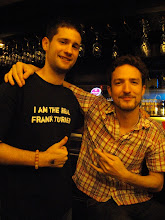He goes into saying that “Free” isn’t sustainable just by advertising dollars. From people using a free service but then paying for the premium service to giving away free razors then charging a lot for the blades (think Gillette), his model isn’t just give away things and you’ll become a millionaire. You use “Free” to sell the premium good.
So yeah, I get that. In fact, that’s nothing new. Free samples have been around a long time. But what left me with the “eh” feeling was his view of how companies can also raise revenue by giving away things for free:
…it’s the unwitting free labor of thousands of people. Likewise for rating stories on Digg, voting on Yahoo Answers, or using Google’s 411 service. Every time you search on Google, you’re helping the company improve its ad-targeting algorithms. In each case, the act of using the service creates something of value, either improving the service itself or creating information that can be useful somewhere else. Whether you know it or not, you’re paying with your labor for something free. Pg. 28 – 29
With Google, Facebook and MySpace all currently going through crisis management and bad PR due to leaking user (“customer”) information, Anderson seems to ignore the 300-million pound gorilla in the room – the issue of privacy.
Anderson even admits that Facebook and YouTube still haven’t turned any kind of a actual profit yet, even with their huge user base and “Free” model. They haven’t been able to figure out the right formula to create ads that attract the people that the ad’s are aiming for. In fact, Facebook can only sell ads at around $1 per 1000 views – rock bottom! So what are companies that give away “something” for nothing to do? Google, for all of its free services, is still driven by selling ads (through Google AdSense and to businesses who want a good placement on their search engine). Google hasn’t turned a profit by giving away spreadsheets and e-mail.
But it has earned some money by using the data collected by the usually unknown to the user. What has this data been used to do? And as earlier quoted, “…improve its ad-targeting algorithms… or creating information that can be useful somewhere else.”
“Useful somewhere else” now includes face recognition software that it developed by giving Picasa away for free. Not to mention many privacy concerns due to Google Earth (just imagine if the US government put up pictures of everyone’s home!).
Now with Facebook under attack for letting users information become public information via web-searches (although, if someone’s going to put something that they don’t want others to see online…). This also includes work info, school info, and other specific things that advertisers can use to create more targeted ads to send to you.
As Electronic Frontier Foundation put it:
It’s slowly but surely helped itself — and its advertising and business partners — to more and more of its users’ information, while limiting the users’ options to control their own information.
So with everything going towards “Free”, and users expecting it now, how do these companies go from “great ideas” to “great ideas that are sustainable”? It seems to me currently that for web-based companies built on “Free”, it’s only by selling user data to outsiders – and without you knowing it.
But is it these companies fault? I mean, don’t the users of these services voluntarily input the information that is then sold off to businesses? Well, if the past year in American politics and the topic of individual privacy and freedom is any indicator, yes. And because of that, and the destruction that “Free” brings to business models without replacing it with newer sustainable models, some major companies that use to give away things for free (think News Corp) are now going back to the paid subscription model.
Are we now in the beginning stages of the backlash to free? Is privacy going to trump “Free” as the next big wave in consumer behavior? Was “Free” just another “here today, gone tomorrow” business fad that was as poorly thought through as the dot-com bubble was in the late-90’s?
I’m going to be bold and make my prediction public: Yes, I think so. I think that anything that seems too good to be true usually is. The big investments made by Microsoft for Facebook and by Google for YouTube will be seen in a few years in the same light as Time Warner Cables investment into America Online.
“Free” is not sustainable by itself, unless it is supported by a premium service or it is abused and mined for data that can be used to sell stuff to the users.
So is marketing bad? Is gathering information on users, even without them knowing about it, a bad thing? Just imagine if it were the government.
Replace “Facebook”, “YouTube”, and “Google” with “The Federal Government” or “State Government”. Personally, I don’t think trusting big business is any safer than trusting big government.

No comments:
Post a Comment